« July 2008 | HOME PAGE | September 2008 »
August 30, 2008
Free Smoothies in Sanlitun
![]() A hot tip for those of you living in Beijing! I only wish I had told you earlier. The Village in Sanlitun is Beijing's newest top-brand shopping area, with an Apple store, the world's largest Adidas store, and a bunch of other expensive crap.
A hot tip for those of you living in Beijing! I only wish I had told you earlier. The Village in Sanlitun is Beijing's newest top-brand shopping area, with an Apple store, the world's largest Adidas store, and a bunch of other expensive crap.
I had first visited the Adidas store a few days before the Olympics, and up on the fourth floor I had a strange experience. I ordered a Y20-somthing fresh carrot juice at the Element Fresh counter, and when my juice came up I was told it was free. What!?? Yes, completely free... but I figured it was an opening week fluke or some kind of promotion.
I went back today with my friend, Jim, though, and we straight-up asked the staff: are juices still free? We were told, "Yes, until we officially open on September 11th." Complete madness...
So my friend and I each ordered a smoothie, and didn't fork over one fen. They've got fresh juice, smoothies, and coffee... and I think food will be coming next month. Anyway, rush over as many times as possible in the next two weeks to get your free juice/smoothie/coffee. Heck, go every day if you want. Tell 'em I sent you.
posted August 30, 2008 at 04:03 PM unofficial Xinjiang time | Comments (49)
August 27, 2008
Joe Biden, Xinjiang, and the CIA

With Joe Biden tapped to serve as Barack Obama's running mate and the Democratic National Convention underway, I've been thinking back to a simpler time... all the way back to 1979. It was an era when the Cold War was still hot, the Shah had just been overthrown in Iran, Deng Xiaoping had taken control of China, and Senator Joseph Biden was a young statesman trying to make his mark on the world.
Here's the story from a 1981 New York Times article revealing the existence of joint Sino-US intelligence monitoring stations in Xinjiang:
The United States and China are jointly operating an electronic intelligence-gathering station in China to monitor Soviet missile tests, according to senior American officials.
The facility was opened last year in a remote, mountainous region of the Xinjiang Uighur Autonomous Region in western China, near the Soviet border....
Intelligence collected by the station is shared by the United States and China, officials said. The facility is furnished with American equipment and is manned by Chinese technicians. Advisers from the Central Intelligence Agency periodically visit the station.
Now, obviously Joe Biden didn't drop the CIA into Xinjiang all by himself, but his role seems to have been central...
According to information pieced together from officials in the last eight months, the idea to set up listening posts in China was first proposed to the Peking Government in 1978, before the establishment of diplomatic relations. Initially, the Chinese were reluctant to agree, apparently concerned about cooperating too closely with the United States.
The idea was pressed again after the overthrow of Shah Mohammed Riza Pahlevi in January 1979. Senator Joseph R. Biden Jr., Democrat of Delaware, raised the issue with the Chinese in April 1979 when he led a Senate delegation to Peking. At the end of the visit, Senator Biden said that Deng Xiaoping, the Chinese leader, appeared sympathetic to the introduction of United States intelligence equipment into China, provided it was operated by the Chinese.
Formal agreement between the two Governments followed later in 1979, with the Chinese insisting that their technicians man the facilities and that operations be conducted in absolute secrecy.
I first heard about the monitoring stations when I was still working at NBC in New York. I had already arranged to go to Korla for a year of English teaching. NBC News' spook expert, Robert Windrem, made several comments in jest to me about the real reason I was heading to Xinjiang... as he'd heard of CIA stations based in Korla and Qitai.
It's not really clear if the stations are still in operation, though if they are I expect the equipment would have been updated to conduct more modern intelligence gathering operations rather than tracking ICBM launches. This site says the Xinjiang facilities were later linked to the ECHELON system, which to my understanding monitors any and all digital communication around the globe to glean intelligence clues for the US, the UK, Australia, New Zealand, and Canada.
More importantly, that 1999 article from Koenig's International News also suggests the sites in Xinjiang were still up and running as late as the end of the Clinton era. Congressional investigators believe the sites were still running, and wanted answers:
House and Senate investigators want to know why the U.S. and China continue to operate joint signals (SIGINT) intercept bases inside the People's Republic of China. The joint CIA/PLA bases are located at Korla and Qitai in the western province Xinjiang... In response, Clinton administration Defense Dept. officials refused to answer questions about the joint CIA/Chinese Army bases.
"We are going to have to call them in on the carpet," stated one frustrated Congressional investigator. "We certainly need to know about Korla and Qitai. The Chinese Army is setting up a SIGINT base with the Cubans to monitor U.S. military forces 90 miles from Florida. Just how much of that new PLA base is 'made in the U.S.A'?"
Wikipedia still lists the Xinjiang bases as operational on its SIGINT page, describing the sites as "operated jointly with resources from the US CIA's Office of SIGINT Operations, probably focused on missile and space activity."
For those of you who are wondering... no, I didn't make much of an effort to find the station in Korla, out of both a fear for my safety and absolutely zero in the way of coordinates or any kind of exact location. Besides, I felt that I'd already pushed things a bit far with my hunt for the mysterious white targets in the desert that I had found on Google Earth.
One thing that does strike me as odd, though. There's a "weather station" in the hills just north of Korla that looks very much like the ECHELON site seen here, except the dome is raised up on a platform much like an air traffic control tower. I visited the site once when I still had my motorcycle, and was even allowed to go to the top of the tower by a couple of farmer-types that lived near the base and had the keys. There were a bunch of big computers on the top floor, but of course I couldn't see inside the dome... I wonder?
Anyway, Obama/Biden for President/Vice President 2008!
U.S. AND PEKING JOIN IN TRACKING MISSILES IN SOVIET
By PHILIP TAUBMAN, SPECIAL TO THE NEW YORK TIMES
Published: June 18, 1981
The United States and China are jointly operating an electronic intelligence-gathering station in China to monitor Soviet missile tests, according to senior American officials.
The facility was opened last year in a remote, mountainous region of the Xinjiang Uighur Autonomous Region in western China, near the Soviet border. Two key Soviet missile-testing bases are at Leninsk, near the Aral Sea, and at Sary-Shagan, near Lake Balkhash. Leninsk is 500 miles from the nearest point on the Chinese border, Sary-Shagan 300 miles.
The establishment of the listening post involved a far deeper level of military cooperation between Washington and Peking than either Government had publicly acknowledged. Sensitive Military Relationship
In Peking yesterday, at the conclusion of talks with Chinese leaders, Secretary of State Alexander M. Haig Jr. announced that the United States had decided in principle to sell arms to China. The United States had previously sold China only nonlethal military equipment.
Operation of the facility, which was not mentioned by Mr. Haig, brought the two nations into a sensitive, secret military relationship during the Carter Administration.
Officials said the post has filled a ''critical'' vacuum created when similar stations in Iran were abandoned during the Iranian revolution two years ago. They described the facility as one of Washington's most sensitive and important intelligence operations. Shared by the Two Nations
Intelligence collected by the station is shared by the United States and China, officials said. The facility is furnished with American equipment and is manned by Chinese technicians. Advisers from the Central Intelligence Agency periodically visit the station.
American officials sought to keep the existence of the station secret, fearing that disclosure could adversely affect relations between the Soviet Union and the United States, and heighten tensions between the Soviet Union and China. In recent days, however, information about the operation has begun circulating openly here.
Soviet leaders, American officials said, are already seriously troubled by the growing relationship between Washington and Peking. They said the Soviet Union may already know about the facility but had not felt it necessary to respond because its presence was not a public embarrassment to them.
Anatoly F. Dobrynin, the Soviet Ambassador, in a meeting with American officials at the State Department today, condemned United States plans to lift restrictions on the sale of arms to China.
Disclosure of the monitoring post, officials here said, could also unsettle internal affairs in China, where moderate leaders may be vulnerable to charges that they made secret deals with the United States.
According to information pieced together from officials in the last eight months, the idea to set up listening posts in China was first proposed to the Peking Government in 1978, before the establishment of diplomatic relations. Initially, the Chinese were reluctant to agree, apparently concerned about cooperating too closely with the United States.
The idea was pressed again after the overthrow of Shah Mohammed Riza Pahlevi in January 1979. Senator Joseph R. Biden Jr., Democrat of Delaware, raised the issue with the Chinese in April 1979 when he led a Senate delegation to Peking. At the end of the visit, Senator Biden said that Deng Xiaoping, the Chinese leader, appeared sympathetic to the introduction of United States intelligence equipment into China, provided it was operated by the Chinese.
Formal agreement between the two Governments followed later in 1979, with the Chinese insisting that their technicians man the facilities and that operations be conducted in obsolute secrecy. Surveys for Two Sites Made
Surveys for two facilities were made. The Chinese eventually agreed to permit only one, officials said. The site in western China is close to ideal, officials said, because it allows monitoring of Soviet missile tests from launch through flight over Siberia to dispersion of warheads. It does not permit monitoring of the final stages of flight, including the reentry of the warheads.
The monitoring of missile tests is critical to the verification of Soviet compliance with key provisions of strategic arms agreements. It permits the United States, for example, to detect whether new missiles are being developed.
The performance characteristics of missiles are detected in a number of ways, including tracing the missile with radar and monitoring data transmitted by radio signals. Test Range Over Siberia
Typically, the United States would be seeking to determine the number of warheads the missile being tested can carry, its range, and the accuracy of re-entry vehicles that carry the warheads. Analysis of the information can show whether the missile is a new or old model or a variant.
The Soviet test base at Leninsk is used for testing intercontinental ballistic missiles, officials said. The test range extends out over Siberia, with re-entry over the Kamchatka Peninsula or the western Pacific.
The base at Sary-Shagan is used for testing antiballistic missile systems, according to officials. The listening post in China can track tests from both sites, beginning with the launch. Since normalization of relations between the United States and China in January 1979, the two nations have moved swiftly to forge a close friendship, marked by expanding trade and military cooperation.
The operation of a joint intelligence facility targeted on the Soviet Union, however, goes beyond any declared military cooperation.
posted August 27, 2008 at 09:04 AM unofficial Xinjiang time | Comments (70)
August 19, 2008
Michael Goes to the Olympics




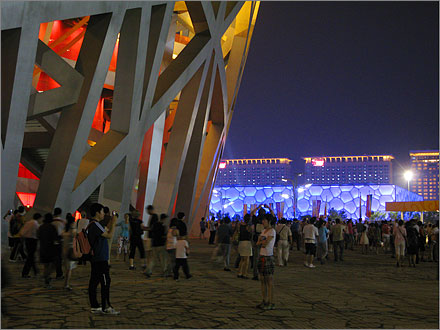
Photos from last night's evening at the Bird's Nest. We bought our front-row tickets, originally marked at Y800, for just Y1,000 from an American scalper... thanks, dude from Tampa!
The sidewalk outside the southwest corner of the Olympic Green is the place to go if you still want to get tickets. (Look for the crowd under the footbridge.) Arrive a couple of hours before the event, and jump into the fray! Be prepared to bargain hard.
Also, I forgot to mention to those of you who can read German... check out "Ich benutze Umwege" on Zoomer. It's an interview with me about this blog, translated into German. You can read a version translated back into English by a computer here.
posted August 19, 2008 at 10:44 AM unofficial Xinjiang time | Comments (84)
August 17, 2008
Crackdown on Fake Minority Female Terrorists

Or, let's just call it Xinjiang News — Olympic Edition.
First off, as some of you may have read, it's been revealed that many of the 56 "minority" representatives who ran across the pitch during the opening ceremony were actually Han Chinese children wearing costumes. It's a common trick during your average CCTV televised spectacular, but someone should've spent an extra buck or two to acquire some real minority kids for the Olympics.
The SCMP was especially harsh:
Even the children were fake....
The youngsters, dressed in 56 ethnic costumes in the opening ceremony of the Beijing Olympics, were not all selected from the nation's ethnic communities, a top Bocog official acknowledged yesterday.
While the ceremony guide reads, "Fifty-six children from 56 Chinese ethnic groups cluster around the Chinese national flag, representing the 56 ethnic groups," many of them were actually Han Chinese children dressed to represent the minorities.
"Some performers were dressed in ethnic costumes, which are very normal in mainland performances. There is nothing special," said Wang Wei , executive vice-president of the Beijing Organising Committee for the Olympic Games.
This is the third incident of misrepresentation to emerge from the ceremony....
"I don't know the concrete details and where the children are from. China has such a tradition in art performance [where] you can wear costumes of minority groups.
"As long as there is a need, performers will wear the costumes to signify people's friendship and happiness."
And now to the aftermath of the three attacks in Xinjiang over the last two weeks. It's not exactly as if authorities have been soft on East Turkestan separatists in the past, but in case anyone was wondering, a big crackdown is coming once the Olympics are over and all the journalists have gone home.
Xinjiang's leaders have said as much, according to a report on Xinjiang TV:
Xinjiang CCP Secretary Wang Lequan spoke at the meeting and stressed the need for the various departments to increase their sense of responsibility and sense of mission, strengthen work at the grassroots level, maintain a high level of vigilance, implement the party and central government's policies to maintain social and political stability in Xinjiang and severely crack down on violent terrorist activities of the "three evil forces."
Wang Lequan said the "8.4" attack on police was a violent terrorist act planned, organized and premeditated by foreign and domestic elements of the "three evil forces." Wang called the fight with the "three evil forces" a "life or death struggle" and stressed that the battle between separatists and anti-separatists in Xinjiang was long-term, severe and complicated.
Chairman of the Xinjiang government, Nuer Baikeli [Nur Bekri], also spoke at the meeting and stressed the need to take initiative in the fight against the enemy and keep pressure on the "three evil forces."
Xinjiang's court system will also be joining in the fun:
This reporter has learned from Xinjiang Uygur Autonomous Region's Higher People's Court that courts at all levels in Xinjiang will maintain a hard-strike and high-handed posture on ringleaders of the "three forces" [san gu shi li - international terrorism, national separatism, and religious extremism) and culprits of other serious crimes and that the courts will promptly mete out heavy punishment against them in accordance with the law.
It has been learned that in the coming period, the people's courts at all levels in Xinjiang will regard ensuring national security and social stability their primary task and will earnestly safeguard national security and unity.
Also, after initial reports that there was "no clear evidence" of a link between the attacks in Kuqa and Kashgar, a Chinese government think-tank has come out as saying the link is definite:
Terrorists are beginning to have extremist ideas, incited by forces outside the country.
Two terrorist attacks are linked with each other. They are not individual cases. Both attacks happened around the time of the Beijing Olympics opening, and both happened in southern Xinjiang region, where many East Turkistan supporters exist. The terrorists shared common targets and used similar handmade bombs.
The following patterns are imaginable regarding the link between [the attacks in] Kashgar and Kuqa:
1) the suspects directly made contact with each other; and
2) in both cases, the suspects were linked with forces outside the country at the same time.
The East Turkestan forces may think that the Beijing Olympics, which attracts attention from media, is a big opportunity. They know that it is difficult to set the Olympics itself as a target. However, if they can capture public sympathy and support around the world, they can collect funding.
Apple Daily had an interview with the same "expert" — Li Wei, director of the Centre for Counterterrorism Studies at the China Institute of Contemporary International Relations in Beijing — but stressed the importance of the involvement of women in "all" the recent attacks. Were there really women involved in both of the Kashgar attacks?
Keeping in mind that women were involved in all of the recent terrorist attacks in Xinjiang, Li said that this new development deserved high attention from the concerned departments.
Li pointed out that participation of women in violent terrorist attacks is a new topic in the study of international anti-terrorism. Since the behavioral tendencies and psychological quality of women vary according to their residing countries and nationalities, it is necessary to consider social factors and family background of women to come up with a specific analysis. "We very much hope to conduct face-to-face investigations with those women, who participated in terrorist and criminal activities. This will be extremely helpful to the study of anti-terrorism."
Li added helpfully that "the secretive nature of terrorist activities has caused a certain degree of difficulties in preventing and combating terrorism." How true.
Fake minority children took part in Games opening ceremony
South China Morning Post
August 16, 2008 Saturday
BYLINE: Jane Cai and Peter Simpson in Beijing
Even the children were fake.
The youngsters, dressed in 56 ethnic costumes in the opening ceremony of the Beijing Olympics, were not all selected from the nation's ethnic communities, a top Bocog official acknowledged yesterday.
While the ceremony guide reads, "Fifty-six children from 56 Chinese ethnic groups cluster around the Chinese national flag, representing the 56 ethnic groups," many of them were actually Han Chinese children dressed to represent the minorities.
"Some performers were dressed in ethnic costumes, which are very normal in mainland performances. There is nothing special," said Wang Wei , executive vice-president of the Beijing Organising Committee for the Olympic Games.
This is the third incident of misrepresentation to emerge from the ceremony. It was revealed that a nine-year-old girl lip-synched the song Ode to the Motherland because the real singer was deemed not pretty enough, and some of the "live" fireworks seen on TV screens around the world were computer-generated.
After enduring the uproar in mainland chat rooms and in the international media following the previous two faking incidents, Beijing officials still seemed unprepared for the reaction of overseas journalists yesterday.
Asked why the reality contrasted with the description in the ceremony guide pamphlet, Mr Wang said: "I think you are being very meticulous [in your questioning]. I won't argue with you.
"I don't know the concrete details and where the children are from. China has such a tradition in art performance [where] you can wear costumes of minority groups.
"As long as there is a need, performers will wear the costumes to signify people's friendship and happiness."
Hu Xingdou , a political analyst at the Beijing Institute of Technology, said mainland officials were used to faking in performances and took it for granted even in events concerning the nation's dignity.
"They do it unconsciously. Truth is not valued as highly as a spectacular result," he said. "It should be a good thing that the old and rotten values are confronted by one cherishing the truth. However, I don't expect a change will happen. The Chinese bureaucratic system is so deeply rooted."
China is struggling to keep conflicts with its ethnic groups out of the spotlight during the Olympics. Human rights groups have tried to use the Olympics to highlight what they say is government repression of Tibetans and Uygurs in Xinjiang .
China's Xinjiang leader urges more anti-terror effort 13 Aug
BBC Monitoring Asia Pacific - Political
August 15, 2008 Friday
During its regularly scheduled "Xinjiang News Hookup" (Xinjiang Xinwen Lianbo) programme broadcast at 1300 gmt on 14 August, Urumqi Xinjiang Television 1 [XJTV-1] in Standard Chinese, television of the Xinjiang Uighur Autonomous Region Government, carries the following announcer-read report over video:
On 13 August, the Xinjiang Autonomous Region held a meeting of the responsible persons of prefectures, autonomous prefectures, and cities. Xinjiang CCP Secretary Wang Lequan spoke at the meeting and stressed the need for the various departments to increase their sense of responsibility and sense of mission, strengthen work at the grassroots level, maintain a high level of vigilance, implement the party and central government's policies to maintain social and political stability in Xinjiang and severely crack down on violent terrorist activities of the "three evil forces." Wang Lequan said the "8.4" attack on police was a violent terrorist act planned, organized and premeditated by foreign and domestic elements of the "three evil forces." Wang called the fight with the "three evil forces" a "life or death struggle" and stressed that the battle between separatists and anti-separatists in Xinjiang was long-term, severe and complicated. Wang discussed the need to strengthen the political standards of leaders and cadres in order to ensure they maintain a strong and clear-cut political stance in the fight to oppose ethnic separatism, preserve ethnic unity and maintain national unity. Chairman of the Xinjiang government, Nuer Baikeli [Nur Bekri], also spoke at the meeting and stressed the need to take initiative in the fight against the enemy and keep pressure on the "three evil forces." Nuer Baikeli said there should be focus on the present and long-term struggle to maintain stability in the overall situation of society. Other leaders in attendance, in the order they were listed, were Ailigeng Yimingbahai, Aisihaiti Kelimubai, Nie Weiguo, Zhu Jinlin, Fu Qiang, Han Yong, Li Ge, Xiaokaiti Yiming, Nuerlan Abudumanjin, Song Airong, Zhu Hailun, Kurexi Maihesuti, Erkenjiang Tulahong and Hua Shifei.
Source: Xinjiang Television, Urumqi, in Standard Chinese 1300 gmt 14 Aug 08
China's Xinjiang court chief vows to crack down on "three forces"
BBC Monitoring Asia Pacific - Political
August 15, 2008 Friday
Text of report by Chinese news agency Zhongguo Xinwen She
[By reporter Yan Wenlu: "(Social Life) Xinjiang Higher People's Court To Sternly Crack Down on Crimes of the 'Three Forces' in Accordance With the Law"]
Urumqi, 15 Aug (ZXS) - This reporter has learned from Xinjiang Uygur Autonomous Region's Higher People's Court that courts at all levels in Xinjiang will maintain a hard-strike and high-handed posture on ringleaders of the "three forces" [san gu shi li - international terrorism, national separatism, and religious extremism) and culprits of other serious crimes and that the courts will promptly mete out heavy punishment against them in accordance with the law.
It has been learned that in the coming period, the people's courts at all levels in Xinjiang will regard ensuring national security and social stability their primary task and will earnestly safeguard national security and unity. Rozi Ismail, president of the Xinjiang Higher People's Court, said: Courts at all levels will always maintain high vigilance against ethnic separatism and illegal religious activities to safeguard the motherland's unity and national security and will give top priority to the trial of crimes endangering national security. In dealing with ringleaders of the "three forces" and culprits of other serious crimes, we must give expression to the guidelines that call for hard strike in accordance with the law. This is also essential to safeguarding Xinjiang's social stability and national security. Cadres and officers of the people's courts at all levels in Xinjiang should take a clear-cut stand in opposing national separatism and illegal religious activities and shall do so by taking concrete action.
It has been learned that the people's courts at all levels throughout the Xinjiang region will continue to mete out severe punishment on violent crimes, terrorist crimes, crimes that seriously affect the general public's sense of security, multiple crimes that encroach on property rights, crimes related to illegal drugs, crimes committed by syndicate-like organizations, and crimes that seriously undermine economic order. The people's courts in Xinjiang will punish in accordance with the law crimes causing major production safety accidents and crimes committed by state functionaries such as embezzlement, bribery, and malfeasance.
Source: Zhongguo Xinwen She news agency, Beijing, in Chinese 15 Aug 08
Chinese anti-terror expert says two bombings in Xinjiang linked
BBC Monitoring Asia Pacific - Political
August 15, 2008 Friday
Text of report by Japanese newspaper Yomiuri Shimbun on 14 August
[Gist of interview with Li Wei, anti-terrorism specialist at PRC think thank: "Terrorist Bombings Linked With Each Other; Chinese Expert Analyses"]
Li Wei, an anti-terrorism specialist and director of the Institute of Strategic and Security Studies at China Institute of Contemporary International Relations (CICIR), the Chinese Government-managed Think Thank, indicated on 12 August that the bombings, which happened in Kuqa [Kuche] and Kashgar in Xinjiang Uyghur Autonomous Region this month, were linked. The following are the main points of his remarks:
The two incidents are the biggest cases which happened in Xinjiang after 2000. In the 1990s, the East Turkistan forces' (which call for independence of Xinjiang) main targets of terrorism were ordinary citizens, public security, armed police, and local senior officials. The methods they used were bombings, attacks, and assassinations. Even now, the methods have not basically changed.
The difference is that the terrorists have increased their suicidal tendency and are ready to die. In Kuqa, a female suspect committed suicide before being arrested. Terrorists are beginning to have extremist ideas, incited by forces outside the country.
Two terrorist attacks are linked with each other. They are not individual cases. Both attacks happened around the time of the Beijing Olympics opening, and both happened in southern Xinjiang region, where many East Turkistan supporters exist. The terrorists shared common targets and used similar handmade bombs.
The following patterns are imaginable regarding the link between [the attacks in] Kashgar and Kuqa: 1) the suspects directly made contact with each other; and 2) in both cases, the suspects were linked with forces outside the country at the same time.
The East Turkestan forces may think that the Beijing Olympics, which attracts attention from media, is a big opportunity. They know that it is difficult to set the Olympics itself as a target. However, if they can capture public sympathy and support around the world, they can collect funding.
Source: Yomiuri Shimbun, Tokyo, in Japanese 14 Aug 08
Chinese expert attaches importance to women's involvement in Xinjiang attacks
BBC Monitoring Asia Pacific - Political
August 15, 2008 Friday
Text of report by Hong Kong newspaper Apple Daily (Ping Kuo Jih Pao) website on 12 August
[Report by staff reporter: "Antiterrorist Expert: Women Become New Forces of Attack"]
Li Wei, director of the Centre for Counterterrorism Studies at the China Institute of Contemporary International Relations in Beijing, said in a telephone interview with Ping Kuo Jih Pao on 12 August that there was a new development for a group of women to perform considerably radical actions as seen in the Kuche [Kuqa] terrorist attack. Keeping in mind that women were involved in all of the recent terrorist attacks in Xinjiang, Li said that this new development deserved high attention from the concerned departments.
More People in Nanjiang Sympathize With East Turkestan
Li pointed out that participation of women in violent terrorist attacks is a new topic in the study of international antiterrorism. Since the behavioural tendencies and psychological quality of women vary according to their residing countries and nationalities, it is necessary to consider social factors and family background of women to come up with a specific analysis. "We very much hope to conduct face-to-face investigations with those women, who participated in terrorist and criminal activities. This will be extremely helpful to the study of antiterrorism."
Li added that both of the recent terrorist attacks in Kuche [Kuqa] as well as the raid on police officers in Kashi (Kashgar) earlier this month occurred in Xinjiang's Nanjiang area (southern Xinjiang), where the East Turkistan terrorist forces enjoy more sympathy outside China. In both incidents, the terrorists shared the same target taking public security and armed police officers as their primary targets of attack. Their means and methods of attack were also similar as homemade explosive were used in both the instances.
According to Li, the terrorists are trying to launch attacks one after another to incite more terrorists to personally defy the law. This also illustrates an escalating trend of terrorist activities at home, possibly of an even larger scale. However, the secretive nature of terrorist activities has caused a certain degree of difficulties in preventing and combating terrorism.
Source: Apple Daily website, Hong Kong, in Chinese 12 Aug 08
posted August 17, 2008 at 08:40 AM unofficial Xinjiang time | Comments (82)
August 12, 2008
Swimming from Xinjiang to Taiwan

Your daily dose of Taiwan-related Xinjiang news from the Kyodo News Agency:
A Chinese man claiming to be a political refugee from China's restive Xinjiang region on Monday swam ashore at an outlying island of Taiwan and sought asylum, according to local reports.
With the aid of several flotation devices, Jia Wei, 41, set out on Sunday night from China's southeastern port city of Xiamen for the Taiwan-administered island of Kinmen and washed ashore at dawn Monday, according to the reports.
Kinmen is located just a few kilometres from Xiamen.
Jia, taken into custody by Taiwanese Coast Guard officials, declared he was seeking political asylum and hoped to run into President Ma Ying-jeou during Ma's scheduled visit to Kinmen on Aug. 23, the reports said.
"I'm looking for Ma Ying-jeou to give (me) a home," Jia was quoted as saying.
Hmm. That seems unlikely, since Ma Ying-jeou seems to be Red China's dream come true. It's also not clear whether or not Jia Wei is a Uyghur, although I'd assume so.
Taiwan's Central News Agency took a slightly darker tone:
Jia said he swam nearly eight hours from Xiamen to Kinmen in the hope of meeting Ma and asking him to provide assistance for his family, which he claimed was suppressed by Chinese communists in Xinjiang.
At the time of his arrest, the officers found Jia in possession of a People's Republic of China ID card, two cash notes of one Chinese yuan and a knife.
The Coast Guard's Kinmen branch has initially ruled out any links between Jia and Xinjiang's independence movement.
Later the same day around 11: 05 a.m., soldiers stationed on a small islet off Kinmen's main island arrested another Chinese man who had sneaked into the area....
The two Chinese men have been handed over to the Kinmen Prosecutors Office for further investigation on charges of breaching the National Security Law, the Statute Governing the Relations Between the People of the Taiwan Area and the Mainland Area and other relevant laws.
Only two yuan in his pocket, eh? Then he must be a Uyghur. Yuk yuk yuk...
Not a very exciting story, but I try not to just cover bombings and whatnot. With this story coming out just one day after the Kuqa attacks, predictably almost no one in the media world paid any attention.
Chinese man swims from Mainland to Taiwan, seeks asylum - Kyodo
BBC Monitoring Asia Pacific
August 11, 2008 Monday
Text of report in English by Japan's largest news agency, Kyodo.
Taipei, Aug. 11 Kyodo - A Chinese man claiming to be a political refugee from China's restive Xinjiang region on Monday swam ashore at an outlying island of Taiwan and sought asylum, according to local reports.
With the aid of several flotation devices, Jia Wei, 41, set out on Sunday night from China's southeastern port city of Xiamen for the Taiwan-administered island of Kinmen and washed ashore at dawn Monday, according to the reports.
Kinmen is located just a few kilometres from Xiamen.
Jia, taken into custody by Taiwanese Coast Guard officials, declared he was seeking political asylum and hoped to run into President Ma Ying-jeou during Ma's scheduled visit to Kinmen on Aug. 23, the reports said.
"I'm looking for Ma Ying-jeou to give (me) a home," Jia was quoted as saying.
Identity documents found on Jia reportedly show that he is from the Xinjiang Uighur Autonomous Region, where he claimed he and his family have suffered from political repression. Taiwanese authorities are looking into his case.
In recent days, the region has experienced its biggest spike in violence in recent years as Muslim separatists rebel against Chinese rule in attacks seemingly timed to upstage the Olympic Games under way in Beijing.
In the past week nearly 30 people have died in attacks in the region that the authorities have blamed on ethnic Uighurs. The incidents have led to tightened security in China amid a clampdown already under way.
Many Uighurs claim they are politically repressed, while China typically regards separatists there as terrorists.
Source: Kyodo News Service, Tokyo, in English 1051 gmt 11 Aug 08
Two Chinese men nabbed off Kinmen Island
Central News Agency - Taiwan
August 11, 2008 Monday 9:57 PM TST
by Flor Wang
DATELINE: Kinmen, Aug. 11
Two Chinese smugglers were separately detained Monday off the coast of Kinmen Island while attempting to sneak onto the Taiwan-controlled island county, the Coast Guard Administration (CGA) said.
It was the first time that two cases of illegal Chinese intruders were tracked down in a single day by Kinmen authorities, CGA officers said, adding that an initial probe produced no evidence linking the two men together.
According to an initial investigation by CGA agents, Jia Wei, a 40-year-old ethnic Chinese man from Xinjiang Province in western China, was arrested by officers on patrol after he landed on the island's beach around 6 a.m.
Jia told Coast Guard officers that he was aware of President Ma Ying-jeou's plan to visit Kinmen Island on Aug. 23, and that he had traveled to Xiamen in Fujian province Aug. 9 from Xinjiang.
Kinmen lies just off Fujian's coast.
Jia said he swam nearly eight hours from Xiamen to Kinmen in the hope of meeting Ma and asking him to provide assistance for his family, which he claimed was suppressed by Chinese communists in Xinjiang.
At the time of his arrest, the officers found Jia in possession of a People's Republic of China ID card, two cash notes of one Chinese yuan and a knife.
The Coast Guard's Kinmen branch has initially ruled out any links between Jia and Xinjiang's independence movement.
Later the same day around 11: 05 a.m., soldiers stationed on a small islet off Kinmen's main island arrested another Chinese man who had sneaked into the area.
The 49-year-old man, identified as Yu Shuirong, is from central coastal Zhejiang Province.
Yu told Coast Guard officers that he wanted to look for a job in Taiwan and decided to swim to Kinmen from Xiamen, where he said he had been unable to find work.
The two Chinese men have been handed over to the Kinmen Prosecutors Office for further investigation on charges of breaching the National Security Law, the Statute Governing the Relations Between the People of the Taiwan Area and the Mainland Area and other relevant laws.
According to the Coast Guard's patrol unit on Kinmen, the island's law enforcement authorities have caught 20 illegal immigrants there during the period from January last year until the end of July this year.
posted August 12, 2008 at 02:47 AM unofficial Xinjiang time | Comments (72)
August 10, 2008
Kuqa's Olympic Spirit
 UPDATE TUE 8pm: There's been another attack near Kashgar, with three security officers stabbed to death at a vehicle checkpoint. The suspects are still on the loose.
UPDATE TUE 8pm: There's been another attack near Kashgar, with three security officers stabbed to death at a vehicle checkpoint. The suspects are still on the loose.
Also, Air China received a threat written in English in France threatening the carrier if Muslim prisoners in China aren't released.
UPDATE TUE 3am: Waaaah!? Officials are now saying that two of the attackers were women. One was injured, and one was killed.
The injured Uyghur girl is being identified in pinyin bastardization as Hailiqiemu Abulizi, aged 15, who was "injured while throwing an explosive device and then abandoned by her accomplices who drove away after seeing her injured by her own bombing."
UPDATE MON 7pm: In an unusual response for the Chinese authorities, they're now saying that there is "no clear evidence" of a connection between Sunday's attack in Kuqa and East Turkistan separatism. Police are also unsure if there's any connection between this attack and last week's attack in Kashgar that killed 16 border patrol officers.
All fifteen of the attackers have been identified as Uyghurs. No big surprise there.
••••
The latest from Xinhua on the battle early this morning between police and local militants in Kuqa:
Several Bombings that occurred in northwest China's Xinjiang Uygur Autonomous Region early Sunday morning injured two police officers and a security guard, according to the regional public security department.
The explosions occurred at 2:30 a.m. in Kuqa County, southern Xinjiang, a regional public security department spokesman said.
It was seen that people hurled home-made explosives from inside a taxi, attacking the local public security station and industrial and commercial office.
In the accident, two police officers and a security guard were injured, and two police cars were destroyed.
Police killed five attackers at the scene, the spokesman said.
I'm a bit dismayed that the attacks have spread to Kuqa, as it's a less-visited spot in Xinjiang that I always recommend when I receive emails from tourists planning a trip. It's about halfway between Urumqi and Kashgar by train, making it a perfect place to break up the trip.
It's also very, very Uyghur, with a fantastic Friday market... not to mention ancient ruins, Buddhist caves, a cool little canyon, and one spot that looks exactly like Mordor.
It's also the only place in Xinjiang that I've ever been refused service in a restaurant because I'm American, apparently because of hard feelings over the Iraq War. Here are a few pics from my several visits to Kuqa over the years:
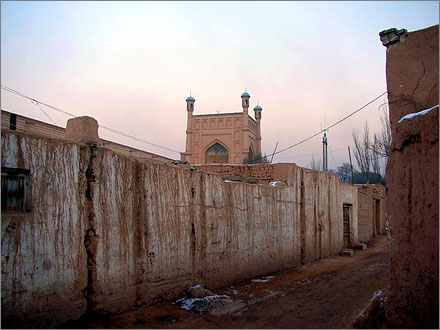
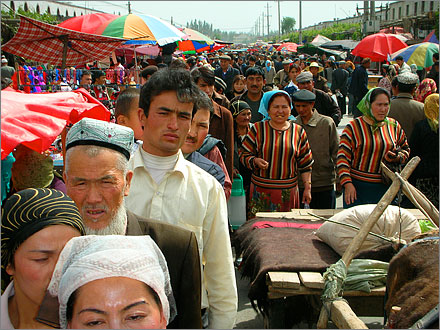
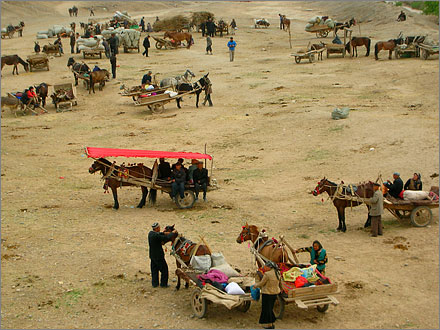
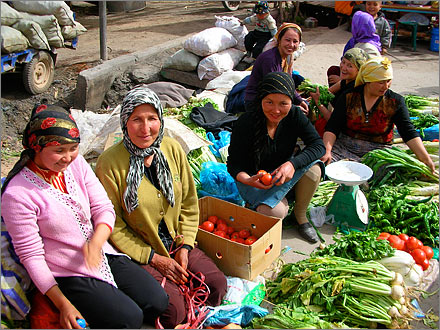
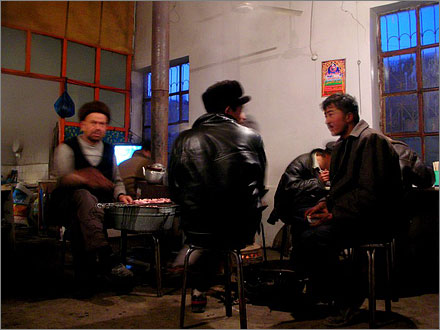
More Kuqa photos here.
Anyway, I'd still recommend a visit to Kuqa, but perhaps you should wait until after the Olympics... or until the current crackdown ends, which doesn't seem like it'll be any time soon.
posted August 10, 2008 at 09:10 AM unofficial Xinjiang time | Comments (50)
August 06, 2008
WTF Beijing?

Perhaps after living in China for a few years, one becomes numb to the occasional random strangeness of life under an authoritarian regime. Rules change suddenly, and you learn to adapt.
But still, this story totally freaks me out:
Tens of thousands of taxi drivers in Beijing... have microphones installed ostensibly for driver safety that can be used to listen to passengers remotely.
The tiny listening devices, which are connected to a global positioning system able to track a cab's location by satellite, have been installed in almost all of the city's 70,000 taxis over the past three years, taxi drivers and industry officials say....
[The] devices in Beijing taxis can be remotely activated without the driver's knowledge to eavesdrop on passengers, according to drivers and Yaxon Networks Co., a Chinese company that makes some of the systems used in Beijing. The machines can even remotely shut off engines.
Holy s%#*... that's so Minority Report. I wonder if they can lock the doors to keep you put while waiting for the authorities to arrive? Sick! And twisted.
Read the full story below. And keep your mouth shut!
P.S. I was going to update you on the Kasghar attack, but The New Dominion has already written everything I wanted to say.
Beijing taxis are rigged for eavesdropping
The Associated Press
August 6, 2008
By SHAI OSTER
BEIJING Tens of thousands of taxi drivers in Beijing have a tool that could become part of China's all-out security campaign for the Olympic Games. Their vehicles have microphones installed ostensibly for driver safety that can be used to listen to passengers remotely.
The tiny listening devices, which are connected to a global positioning system able to track a cab's location by satellite, have been installed in almost all of the city's 70,000 taxis over the past three years, taxi drivers and industry officials say.
As with digital cameras used in cities such as London, Sydney or New York, the stated purpose of the microphones is to protect the driver. But whereas the devices in other countries can only record images, those devices in Beijing taxis can be remotely activated without the driver's knowledge to eavesdrop on passengers, according to drivers and Yaxon Networks Co., a Chinese company that makes some of the systems used in Beijing. The machines can even remotely shut off engines.
Whether these microphones are used to spy on riders is unclear. Asked if police could listen in on conversations in taxis, a Beijing police official declined to comment, saying that such matters were "confidential" and that they were "not supposed to release such details to the public."
China has launched a massive operation to protect the Games. Monday's deadly attack in Xinjiang on a police station underscored Beijing's worries that terrorists will attack the Olympics. The government says it has deployed about 110,000 police, troops and volunteers in Beijing to ensure security.
But Chinese authorities are also determined to thwart protesters or human-rights activists who might try to embarrass the government. Taxi drivers have been told to watch for suspicious behavior and odd packages. Security experts say there is little likelihood that all conversations in taxis are monitored. But the presence of microphones in a place most would consider private is a reminder that there are many ways for Chinese authorities to monitor people.
The U.S. State Department has warned visitors to the Olympics that no place is safe from eavesdropping. "All visitors should be aware that they have no reasonable expectation of privacy in public or private locations," the department said on March 20.
The State Department notice explains that all hotel rooms and offices "are considered to be subject to on-site or remote technical monitoring at all times. Hotel rooms, residences and offices may be accessed at any time without the occupant's consent or knowledge."
Security experts say that all phones in China can be tapped, including cellphones, which send out signals that can be used to track location. That capability can be crippled only by removing the battery. Ahead of the Games, Beijing has also been blanketed by surveillance video cameras, while neighborhood committees (residents' representatives to the government) have also been called in for the effort.
Similar GPS systems with microphones have been rolled out in other parts of China, where taxi drivers have been recruited in the broader security effort.
In the northeastern city of Shenyang, site for some Olympic soccer matches, police have recruited 38,000 taxi drivers as "intelligence agents," according to China's Xinhua news agency. Their cooperation is important because drivers travel widely and meet many people, said Liu Juntao, an official with Shenyang's transportation department, according to Xinhua. Police there are offering citizens a reward of 500,000 yuan, or roughly $73,000, for valid tips about any potential terror plots or planned sabotage by dissidents.
Several Beijing taxi companies declined to comment on the security aspect but said that the GPS helps track taxis and that the microphones will be used for translating services. About a dozen taxi drivers said the microphones were installed about three years ago, when newer cabs were built without protective metal cages around the drivers. Cabbies can turn on the system and alert their dispatch centers by touching a discreet button near the steering wheel.
Activists say they are concerned about the ability to listen to conversations with the devices, which appear unique to China. "This seems to suggest an effort by the police or other security forces to eavesdrop on conversations of passengers, rather than for the immediate safety and security of the taxi driver," said Phelim Kine of Human Rights Watch.
One Beijing taxi driver said he would be uncomfortable if the device in his vehicle could snap pictures of the riders. "I wouldn't want to take a photo of my passengers without their knowledge," said the driver, wearing the new shirt and tie the drivers are required to don during the Olympics. "Wouldn't that violate their human rights?"
Yaxon Networks, based in Xiamen in Fujian province, says on its Web site that its devices allow the police or a service center to "judge if the driver is in danger" through remote surveillance or wiretapping. If it is necessary, the service center can immobilize a taxi remotely by "cutting off the oil or electric supply," the company adds.
As part of its security mobilization, China's military has deployed 34,000 soldiers in Beijing and other cities hosting Olympic events, Senior Col. Tian Yixiang, a senior official at the Olympic security command center told reporters Friday. The military says it has deployed antiaircraft missiles near Games venues and has dedicated 74 jets, 47 helicopters and 33 ships to Olympic security duties.
"Generally speaking, Chinese strengths really lie in pre-empting threats rather than in crisis management or emergency response in the event that there really are any incidents," said Bonnie S. Glaser, an expert on Chinese security at the Center for Strategic and International Studies, a private Washington think tank. She mentioned China's use of the microphones in taxis at a news conference in Washington in advance of President George W. Bush's arrival in Beijing on Thursday.
posted August 06, 2008 at 11:02 PM unofficial Xinjiang time | Comments (117)
August 04, 2008
16 Dead in Kashgar Attack
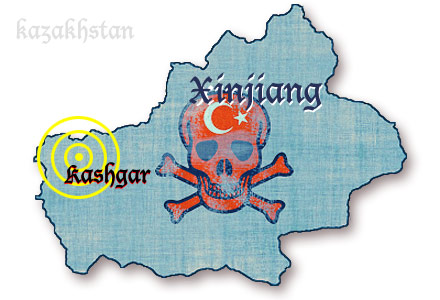
UPDATE 7pm: The two attackers have been identified as a taxi driver and a vegetable seller native to Kasghar. The weapons recovered at the scene supposedly resemble weapons recovered during a January 2007 raid on an terrorist training facility south of Kasghar.
Also, police have apologized to the Japanese photographers seen being roughed up in the photo below. And there are conflicting reports about the arrest of 18 "foreign agitators" today, who may or may not be linked to an earlier incident.
UPDATE 12:30pm: Check it out, I'm quoted in USA Today.
UPDATE 3am: Alright, I'm really going to bed this time. But first, Reuters photos from near the scene of the attack showing a local security presence and a journalist supposedly being detained for taking pictures:
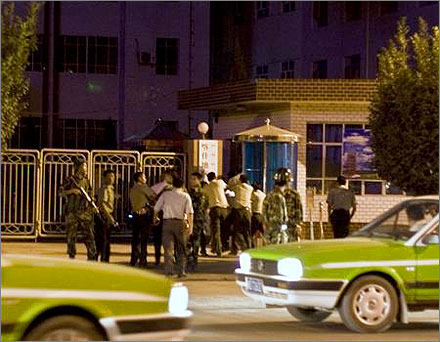
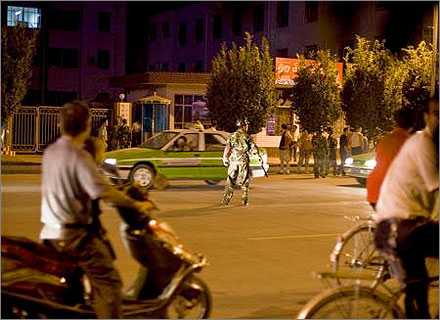
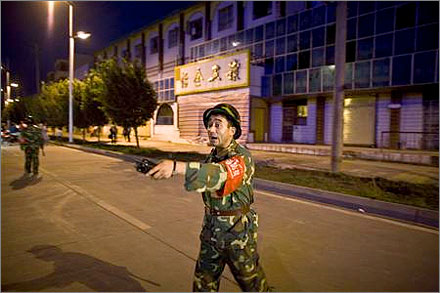
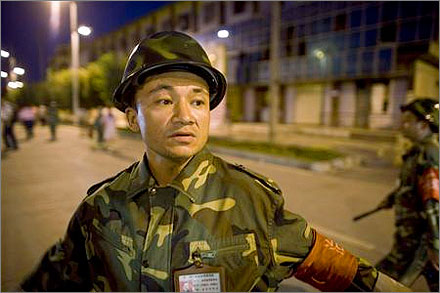
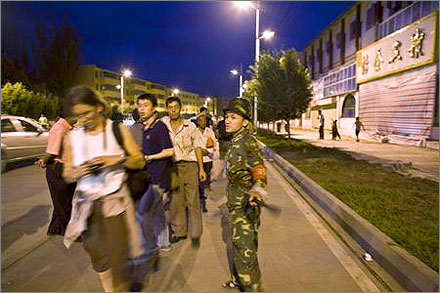
Goodnight.
UPDATE 2am: Conducted an unscientific survey of this story's placement in official Chinese online media. Couldn't find it on the front page of Xinhua's Chinese site and it was fairly buried on the People's Daily Chinese site. The English-language results are posted below:



UPDATE 1am: Other details... Fourteen police officers died at the scene and two others died on the way to the hospital. Xinhua reported observing a "blood stain left on the sidewalk... a broken wire pole and three tree stubs left from the accident." I think someone meant to write "incident". This story is getting very little coverage in the Chinese press.
And you gotta love this informative tidbit: "No civilians were hurt in the attack so far." That's right... so far. Better watch out. It could still be you.
UPDATE 12am: Xinhua has flushed out more details of the attack. The suspects arrested at the scene have been identified as two Uyghur men, aged 28 and 33, one of whom blew his arm off with a homemade explosive device. The attackers drove a dump truck (or perhaps a tip lorry) into a crowd of 70 officers conducting their regular morning exercises at about 8am. 10 homemade explosives, a homemade gun, and 4 knives were recovered from the truck.
UPDATE 8pm: The latest Xinhua report makes it sound like much of the carnage probably occured when the two attackers rammed their dump truck into a group of policemen out jogging. Perhaps they disabled much of the police group with their vehicle and then jumped out and started using grenades and knives?
••••
The details are still fairly sketchy. Something involving two Uyghurs, a truck, some grenades, and a border patrol station full of armed police. But you can bet your bottom dollar that the effects will be felt here in Beijing with the Olympics starting on Friday.
From Xinhua:
Sixteen paramilitary policemen were killed in a bomb attack in China's far western region of Xinjiang, state television reported.
The official China Central Television (CCTV) reported that two people in the Kashgar area drove a truck into a team of policemen and detonated explosives in the vehicle.
Sixteen other officers were injured in the attack, the report said, adding that the two alleged attackers were arrested.
From AFP:
A police station in China's northwestern Xinjiang region was raided Monday morning, with attackers throwing two grenades, leaving a dozen officers injured, state media reported.
"Rioters" drove two vehicles into a station under the border patrol armed police division in the Xinjiang city of Kashgar," the Xinhua news agency reported.
They threw two grenades, which exploded, leaving a dozen officers injured, according to the agency.
From AP:
Attackers rammed a dump truck into a patrol station in China's restive Central Asian border province Monday morning, tossing grenades in a raid that killed 16 officers and wounded others, the state-run Xinhua News Agency reported....
The brief Xinhua account said the attackers drove the dump truck to get inside the paramilitary police compound in the Kashgar area and then exploded two grenades. A state television report gave a different version, saying the police were attacked while marching in front of a hotel while conducting morning drills.
Off to work now, but I'll add some updates later tonight if any more information comes out.
posted August 04, 2008 at 01:43 PM unofficial Xinjiang time | Comments (98)
August 01, 2008
Great Xinjiang Eclipse: T-minus 2h
UPDATE Video of the total eclipse from Yiwu, Xinjiang including a few minutes before the corona appears. It was a nail-biter with the moving cloud cover:

Don't forget to watch the eclipse this evening, which should last from about 6pm to 8pm Beijing time. Totality will occur at 7:09pm over Yiwu, and the Exploratorium is conveniently providing a live feed on their website starting at 6:30pm.
I wish I could be there in Xinjiang, but you can bet I'll be watching online.
posted August 01, 2008 at 02:51 PM unofficial Xinjiang time | Comments (46)
